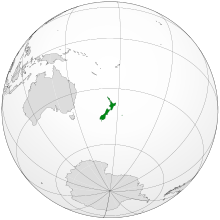LGBT rights in New Zealand
| LGBT rights in New Zealand | |
|---|---|

|
|
| Same-sex sexual activity legal? | Male legal since 1986, female was never criminalised |
| Gender identity/expression | Yes, protected in anti-discrimination law and hate crimes legislation |
| Military service | Gays and lesbians allowed to serve |
| Discrimination protections | Human Rights Act 1993 covers sexual orientation and gender identity/expression |
| Family rights | |
| Recognition of relationships |
Same-sex marriage since 2013 |
| Adoption | Yes since 2013 |
Lesbian, gay, bisexual, and transgender (LGBT) people have most of the same rights as other people in New Zealand. The protection of LGBT rights is the most advanced in Oceania and one of the most liberal in the world, with the country being the first in the region and thirteenth in the world to enact same-sex marriage.
Throughout the late 20th century, the rights of the LGBT community received more awareness and male same-sex sexual activity was decriminalised in 1986, with an equal age of consent to heterosexual intercourse. After recognising civil unions since 2004, New Zealand legalised both same-sex marriage and adoption rights for same-sex couples in 2013. Discrimination regarding sexual orientation and gender identity and expression has been banned since 1993. Gays and lesbians have been allowed to openly serve in the military since 1993.
Male homosexual intercourse was criminalised when New Zealand became part of the British Empire in 1840 and adopted British law making "buggery" punishable by death. (In practice, New Zealand used the death penalty only for offences of murder and once for treason before abolishment in 1961). In 1861 Britain replaced the death penalty for buggery with life imprisonment. New Zealand enacted similar legislation six years later. In 1893 the law in New Zealand was broadened to outlaw any sexual activity between men. Penalties included life imprisonment, hard labour and flogging. Sex between women has never been criminalised in New Zealand.
The Dorian Society (1962–88) was the first New Zealand organisation for homosexual men. The British Homosexual Law Reform Society provided legal assistance to the society. It drafted a petition calling for the decriminalisation of homosexual acts. Signed by 75 prominent citizens, a petition was presented to (and rejected by) Parliament in 1968.
...
Wikipedia
